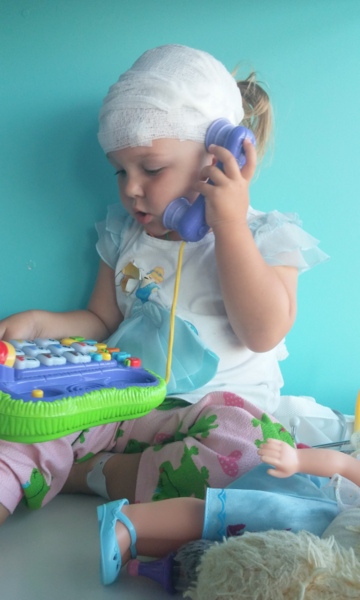Dear Parents of Undiagnosed Children,
I feel like a fraud writing this now because we are hopefully on the cusp of my daughter being diagnosed. But for the last 34 months, we have been you.
As I look back on our journey, a few things stick out more than others. They’re usually the moments that could have broken me but somehow didn’t.
Unless your child has an obvious illness or disability, you’re going to be doubted. I won’t lie, it’s hard. There were so many moments I was screaming in my head at those who doubted us, but outwardly I was assuring them that, yes, our daughter was not healthy.
You will walk into the doors of countless doctors’ offices feeling like it’s a game of hot potato. When egos and hospital politics are added into the mix, your fight can become that much harder. There may be no worse feeling than a doctor telling you they know something is wrong with your child, but they can’t help you because they can’t step on toes.
You will sit in the cold, solid chairs with your heart in your throat, going over the same concerns about your child you have explained so many times before. When the doctors say they aren’t sure, you will smile, nod and hold back the tears. You will drive home and ask yourself if you can keep going. Hours later, your child will exhibit a symptom. You’ll somehow be happy and upset at the same that the symptoms are still there, but there’s no one else around to see it.
You will get what I refer to as a mini-diagnosis. They’ll give this to your child mostly for insurance coding purposes or during the hopeful moments they think they’ve figured the puzzle out. You will feel silly updating those close to you about your child’s health, only to backtrack weeks later when another doctor changes the diagnosis — again. You’ll eventually stop giving updates all together.
You’re going to cry — a lot. I was edgy with those around me. Little things would set me off, and I would have to step back to gain control of the true issue at hand. I have been upset with the situation, but I have never ever wondered why me, why her, why us? I don’t know if that will come later.
You’ll want to talk about your family’s journey all the time, but you will make small talk to avoid it or not to burden others.
You’ll sit in waiting rooms feeling isolated. You’ll notice every child coming in and will try to assess why they’re there. You’ll wonder if you should even be there and consider walking out because surely the other children are so obviously “worse off” than yours. During those times, you’ll start to feel like you don’t even deserve the doctors’ time and care.
The first time a valet guy or nurse from a clinic you’re visiting recognizes you will throw your world off its axis. In that one single, “Hi, welcome back,” you will realize your child is medically needy. It’s a weird balance. You’re grateful they said hello, but, at the same time, it means you’ve been to the clinic a lot.
When your child steps right up on the scale or holds out their arm for the blood pressure cuff without prompting from you, you’ll be oh so proud but oh so sad. As time passes, you will see your family’s journey in others as they walk in for their first appointment.
Medical terminology will undoubtedly become your second language. You will learn terms, treatments and medications from the doctors, the literature they hand you and, let’s be real, Google. When you start using medical jargon at another appointment or ER visit, it will let them know this isn’t your first rodeo.
You’re going to have to find your voice. Even after nearly three years, I am still working on mine. Taking no for an answer isn’t an option. Questions are a must. I’ll be happy when I finally have the confidence to speak to a doctor and it doesn’t feel like I’m in the principal’s office.
You’re going to run into doctors who doubt you, but hopefully you will run into one who will advocate for you and your child. Hold on to those who want to help. Understand that even if the unknown puzzle piques the interest of just one of them, that’s OK.
But the single most important thing I can say to a parent of an undiagnosed child is do not give up. Fight. Continue to tell and retell the story. Feel every emotion, go to bed, wake up and start over. Rally yourself with those who will offer unwavering support.
There may never be an answer, but at a minimum, the symptoms can be treated. And remember, there are so many of us out here. You are never alone.
Editor’s note: This story represents one person’s experience and opinions.

